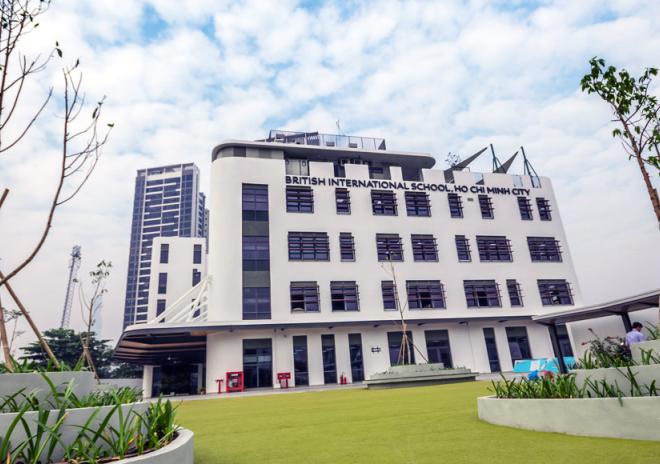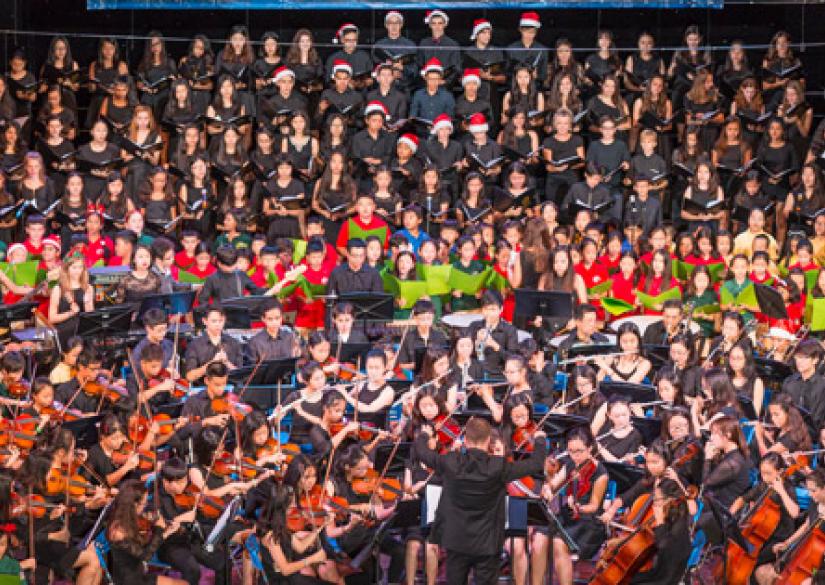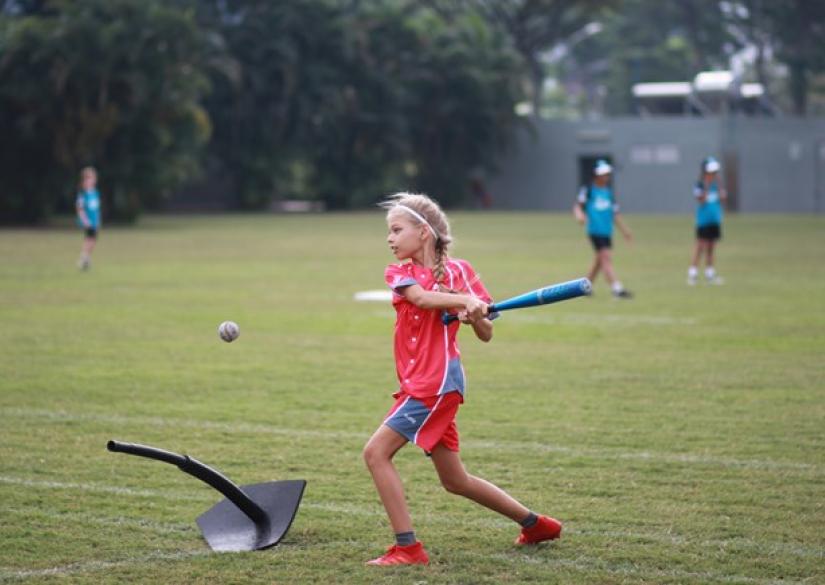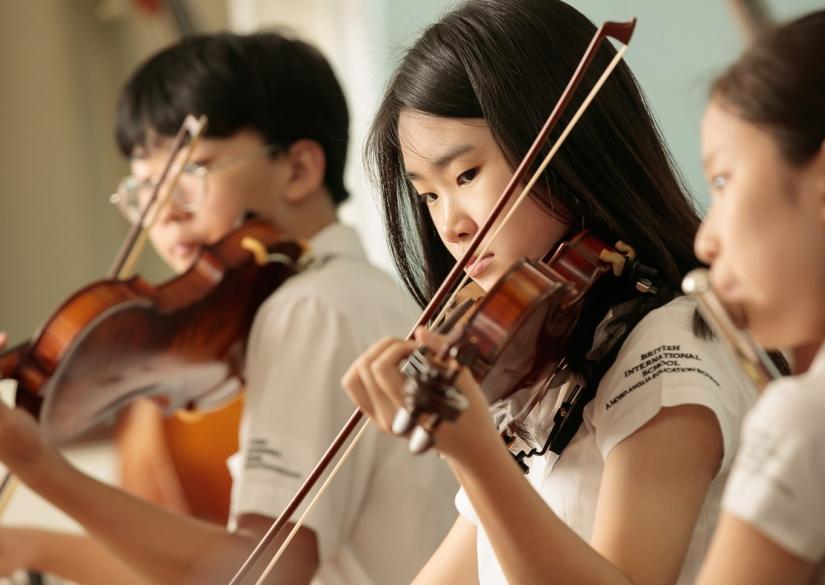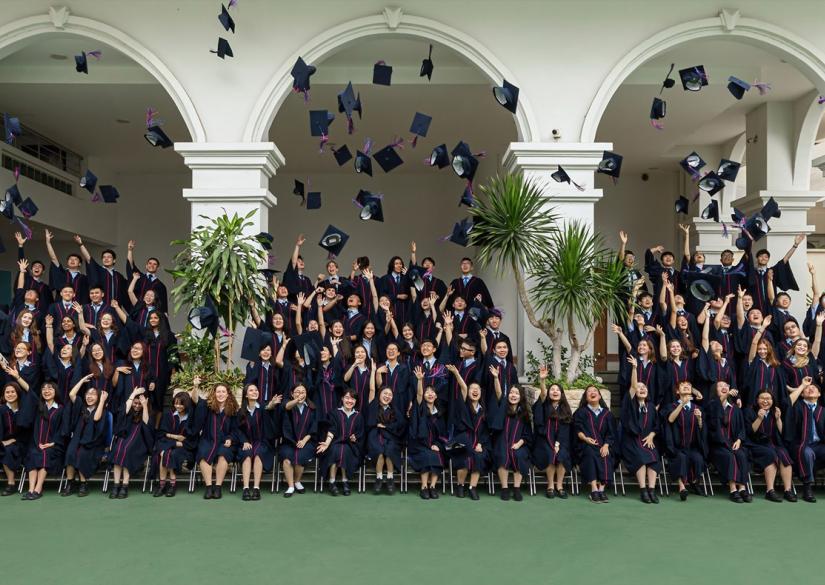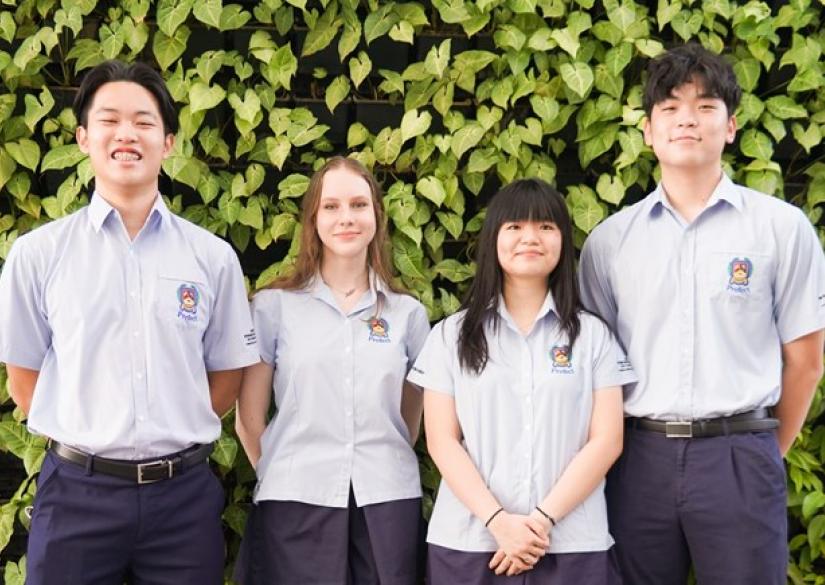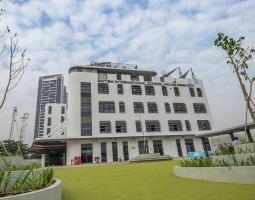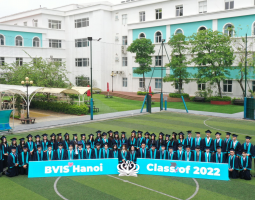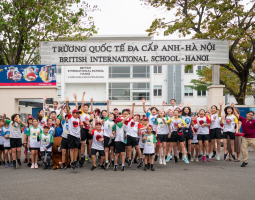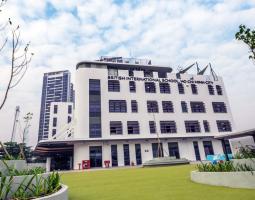British International School Ho Chi Minh City
Programs and prices, tuition fees in British International School Ho Chi Minh City
Fundinotots – 0-3 g.
Fundinotots is a friendly place to meet other parents with young children. The school provides an informal play environment that allows the child to interact with other children in a creative school environment. Playing with sand and water, drawing, large slot machines, stories and music classes are just some of the activities offered.
Fundinotots is open to all babies between the ages of newborns and 36 months.
Early Years Foundation Stage – 2-5 liters.
The Early Years Foundation Stage (EYFS) sets standards for the teaching, development and care of children aged 2 to 5 years. At the British International School in Ho Chi Minh City, pre-school education takes place on a purpose-built campus for young children and infants.
EYFS is an integral part of the school and provides an excellent foundation through which the child will successfully move into a more formal learning environment.
The child will learn skills, acquire new knowledge in the basic areas of learning and development:
- Communication and language
- Physical development
- Personal, social and emotional development.
As a child grows, he develops skills in 4 areas:
- Literacy
- Mathematics
- Understanding the world
- Expressive art and design.
Primary School – 5-11 l.
The primary school curriculum is designed for children of primary school age between the ages of 5 and 11. It combines the British National Curriculum and the International Initial Curriculum (IPC), helps to develop a child's intellectual curiosity, creativity, providing excellent academic results in preparation for secondary school.
The English National Curriculum (ENC) ensures that children develop their potential in all areas by focusing on core subjects: English, Mathematics and Science.
The English national curriculum also places special emphasis on personal, social, medical and economic education. Academic excellence, respect and good manners are the hallmarks of the ENC.
The International Initial Curriculum (IPC) includes geography, history, art and design technology. It is a comprehensive, thematic, creative curriculum with a clear learning process and specific skills in each subject.
The inclusion of international learning objectives is unique to the IPC curriculum and helps the child to start moving towards international education.
Secondary Curriculum – 11-16 l.
The British International School of Ho Chi Minh City offers a secondary school curriculum that provides the broad and balanced education that is necessary to prepare students for high school.
The school offers an International Baccalaureate (IB) program:
- Key Stage 3 – Grades 7, 8 and 9 (Grades 6–8)
- Key stage 4 – 10 and 11 grades (grades 9–10).
The curriculum and teaching in Key Phase 3 is led by subject teachers, here is a more mature analytical approach. English, Mathematics and Science remain the main subjects, adding:
- Geography
- History
- Modern foreign languages
- Art & Design
- Design Technologies
- ICT
- Physical education
- Music
- Drama.
Vietnamese is offered on three levels depending on ability + there is a structured program of personal, social and medical education (PSHE).
In Key Stage 4, students prepare for external examinations known as the International General Certificate of Secondary Education (IGCSE), which are taken towards the end of the 11th grade. The broad and balanced curriculum in a wide range of subjects includes:
- English language
- Math
- Science
- ICT
- French
- History
- Geography
- Business Research
- Art & Design
- Design Technologies
- Music, drama
- Physical education.
The examination qualification is awarded by the Cambridge University International Examinations (CIE).
Sixth Form – 16-18 l.
At BIS HCMC, senior students between the ages of 16 and 18 study the International Baccalaureate Program (IBDP), a prestigious qualification that is recognized at the world's leading universities.
As IBDP's leading school in Vietnam and one of a select group of top international schools in Southeast Asia, and as Nord Anglia' school, BIS goes beyond traditional education to equip students with unique skills to excel in higher education and beyond.
Description of British International School Ho Chi Minh City
- Established year: 1997
- Location: Ho Chi Minh City, Vietnam
- Age of students: from 0 to 18 liters.
- Number of students:1800 people
- Language of instruction: English
- Type: full-time school.
The British International School of Ho Chi Minh City, founded in 1997, has grown into one of the largest international schools in Vietnam, with students between 2 and 18 years old from 50 nationalities. BIS HCMC offers a combination of the British National Curriculum and the International Primary Curriculum (IPC) for primary school students, with middle and high school students taking the International General Certificate of Secondary Education (IGCSE) and International Baccalaureate Diploma Programme exams.
Educational process
The school offers a broad, balanced and differentiated curriculum to meet a wide variety of student needs. The institution operates within the framework of the British National Curriculum, which is adapted through the International Primary Curriculum (IPC). The British national curriculum is divided into "Key Stages". At the secondary school level, it will prepare the child for the International General Certificate of Secondary Education (IGCSE) exams, the International Baccalaureate (IBDP) program.
Working within the structure of the UK system allows for meaningful comparisons with UK national data, realistic expectations of what an individual child can achieve, and the development of individual goals for improvement.
Faculties and colleges
Structure of education:
- Fundinotots
- Early Years Foundation Stage
- Primary School Curriculum
- Secondary Curriculum
- Sixth Form.
Scientific achievements
Students at the 2020/21 BIS HCMC International General Certificate of Secondary Education (IGCSE) have achieved remarkable results, surpassing those of the UK's national and independent schools. 84% of all IGCSE grades received by BIS HCMC students are at the top A* or A grades, which is much higher than in UK public schools – on average around 30% (A*/A), whereas independent UK schools average around 60% (A*/A) for the 2020-21 academic year.
The 2021 IBDP results are an average score of 40.4 compared to a global average of 33.02:
- 68% of students scored an impressive score of 40 or more, which is considered an outstanding result and significantly higher than the world average (9%).
- 6 students scored the highest score of 45
- 18 students scored a near-perfect score of 44.
The work of 3 BIS HCMC students has been published in Nord Anglia's 2018 Creative Writing and Visual Arts Anthology after being shortlisted from more than 4,000 NAE classmates. Global Campus Creative Writing Competition.
Things to know about
BIS HCMC provides its students with the opportunity to receive outstanding additional education:
- Performing Arts with the Juilliard School – students will discover iconic works, and their creative abilities and collaboration skills will be developed through a worldwide network of performers and teachers.
- STEAM, together with the Massachusetts Institute of Technology, is a practical program that will open the child's eyes to the possibilities of natural sciences, technology, engineering, art and mathematics. Students will solve problems and participate in workshops created by MIT experts and develop skills that will help them create the future.
- Working with UNICEF will introduce your child to some of the planet's most pressing problems.
Accommodation, meals, prices
The school provides set lunches for all students from the initial stages to grade 13: a daily selection of freshly prepared hot Asian and European dishes to choose from, a sandwich from the Deli Bar and a vegetarian option (on request). Menus are available in advance, children choose meals every morning during check-in. Children at the initial stage have lunch in their classes, the rest - in school canteens.
Parents can give their children a packed lunch to school: they should put it in refrigerators or baskets in the cafeteria in the morning. Lunch boxes must be signed, glass jars and bottles are forbidden to bring.
Activities British International School Ho Chi Minh City
- A broad and balanced curriculum allows students to access various aspects of physical education, and a wide range of sports clubs are available that provide additional opportunities to participate in alternative activities and participate in sports competitions.
- Students participate in regular in-school competitions and represent the school in matches against other international schools at HCMC, take part in sports competitions in Southeast Asia (such as FOBISIA games).
- Community engagement is an integral part of BIS HCMC's educational ethics and a mandatory part of the school curriculum. The community service program includes more than 50 projects covering all students, with most projects designed to focus on the time and energy donated by students rather than on funds, encouraging a "hands-on approach."
- The school collaborates with cutting-edge educational institutions such as the Massachusetts Institute of Technology and Juilliard to develop programs that will give them the skills to further their education.
- BIS has developed expeditions for each class that demonstrate progress in skills development and ensure continuity of learning in the classroom. Each expedition is carefully planned to provide a range of age-appropriate but challenging challenges for developing leadership, independence, perseverance, and developing respect for different cultures.
Advantages
- The British International School Ho Chi Minh City is part of the Nord Anglia network, which offers a unique global network of campuses, giving the child access to many exceptional opportunities.
- A talented team of teachers, a friendly atmosphere, challenging programs, state-of-the-art equipment and extracurricular activities create an unrivalled learning environment.
- The school provides an environment that educates, academically stimulates and is focused on the development of each child's individual talents and strengths. Students become self-confident, adaptable, open and tolerant people.
- The British International School Ho Chi Minh City has a strong reputation as one of the best academic schools in Vietnam, consistently achieving above-average results both in the UK and around the world. The combination of conscientious, hardworking students, a dedicated team of highly qualified employees and first-class conditions ensure outstanding educational results.
- The institution invests in outstanding talented teachers, each of whom has high qualifications and relevant experience with the British curriculum. Nord Anglia University offers innovative and exciting courses for employees to learn about the world's best practices.
Facilities and equipment at British International School Ho Chi Minh City
The British International School Ho Chi Minh City consists of three purpose-built modern campuses in the vibrant Thao Dien district. All of them are equipped with first-class amenities.
All BIS HCMC school campuses have the following facilities:
- Internet access in all classrooms
- New libraries
- Music cabinets
- Computer labs
- Laboratory with STEAM equipment, including 3D printer, microprocessors and workspace
- Indoor swimming pools
- Large sports halls
- Large cafeterias.
Each individual campus has excellent additional specialized facilities designed to support and enhance learning.
Early Years and Infant Campus:
- Outdoor children's pool
- Creative shared learning spaces
- Special playgrounds
- Mountaineering equipment
- Soft indoor playground
- Touch track.
Junior Campus:
- Music halls with soundproof peripatetic rooms and rehearsal room
- Shared learning spaces for collaborative learning
- Juilliard's multifunctional creative space
- Outdoor play and climbing equipment
- BIS Garden
- Large playgrounds
- Outdoor all-weather astro field
- Outdoor basketball court
- A grass playing field in conjunction with the high school campus.
Secondary Campus:
- Auditorium with full stage and light/sound system
- Theatre with 250 seats
- Scientific laboratories
- Drama Studio
- Dance Studio
- A set of music technologies, including separate rooms for classes
- Art Studio
- Workshops on design technologies with STEAM equipment, including workspace, 3D printers and laser cutters
- New Sixth Form Center
- Department of Career and University Orientation
- A grass playing field in conjunction with a children's campus.
Admission dates and extra charges
The academic year is divided into three trimesters:
- The first lasts from August to December
- The second is from January to April
- The third is from April to June.
Enrolment process
Step 1 – submission of information about the applicant:
- NAME
- Date of birth
- Nationality
- Estimated date of receipt.
After that, the school will confirm the annual group and availability.
Step 2 – Application and Payment
Send the following documents to the school by e-mail:
- Completed Application Form
- Two current passport photos
- Passport or birth certificate (copy)
- Recent school records translated into English for grades 1-12 (if applicable)
- SEN Assessment Documentation (if applicable)
- Physical evaluation signed by a doctor
- Immunization map (copy)
- Bus Service Application Form (if required)
- Payment of the registration fee (by bank transfer).
Step 3 – Additional Information and Test Results
Accommodation is subject to availability, so applicants are advised to submit all application documents as soon as possible to minimise the chance of being placed on the waiting list.
Step 4 – Notification of Admission
BIS HCMC sends an official letter of proposal.
Step 5 – Next Steps
- Payment of the registration fee – a one-time payment guaranteeing a place for the student is paid within 2 weeks from the date of issue.
- Payment of the refundable security deposit and tuition fees – paid before the student enters the school.
Perspectives
In Grade 12, students are given access to a wealth of resources and activities that are curated by a highly skilled team: they offer specific recommendations related to directions, disciplines, or career options.
In Grade 13, when the application season begins, students meet with their designated counselor to assist with applications and related matters. The CUG team conducts seminars on filling out applications, prepares for interviews.
Entry requirements, how to apply, what is required to enrol
- It is required that candidates pass an introductory assessment before they are offered a seat.
- The school may request exam certificates, school reports, recommendations, or a transcript.
- If English is a second language, students must pass the EAL exam.
- If the student is studying outside of Ho Chi Minh City and is unable to pass the entrance exam at the school, testing can be arranged remotely if the existing school agrees to conduct the tests on behalf of bis HCMC.
- Candidates may also be required to undergo an oral interview with the head of the EAL, the deputy head of the campus and/or the head of the campus.
Institution on the map
Residence permits, citizenship and other services
- Guardianship services during the studies
- Student supervision
Review about British International School Ho Chi Minh City
Recommendations on when to apply
| Language courses, schools and children's language camps | Primary and secondary education - private schools | Preparation programmes for entering universities - higher education | Higher education (after completing accredited programs A-level, IB, High School) - Bachelor, Master, MBA |
| - we recommend to apply 6-9 months before the start of the course (some camps and schools offer discounts for early booking or for lengthy study programs) - there are some very popular and high demand children's camps, where the applications need to be submitted 1 year in advance (in particular Switzerland , Great Britain , USA , Canada , Austria) | - we recommend to apply one year before the start of the training program, - some schools have a specific time frame (September-November - please specify an individual school) - some schools require tests in several stages (UKISET, internal tests of the school: English, mathematics, logics, subjects, interview, some require a personal visit) | - we recommend to apply one year before the start of the program, - for Foundation and Pathway programs, IELTS and TOEFL certificates are usually required, respectively | - recommended submission one year before the start of the program, - the deadline normally closes in January, for TOP HEIs and, as a rule, in March in other universities - for a bachelor, a Foundation or Pathway preparatory program a completed A-level, IB, High School + IELTS / TOEFL are required - for Masters you need a graduated higher education, in some cases you need a pre-Masters program - MBA requires completed higher education, work experience preferably at least 2-3 years, etc. |


